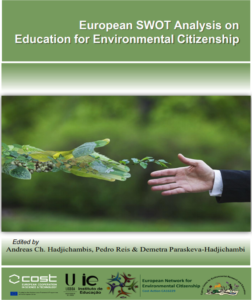Chapter 15: SWOT Analysis of Education for Environmental Citizenship – Short Report for THE NETHERLANDS
Frans van Dam & Marie-Christine Knippels
Abstract: In the Netherlands, over the next few years, the theme of sustainability will be given increasing attention in both primary and secondary education. This is reflected in the increasing attention on the national level, for citizenship and sustainability education. The SWOT analysis shows what respondents regard as strengths: the introduction of new knowledge and skills in the classroom, dealing with planet, people and politics. Education for Environmental Citizenship may sup-port change of attitude of students and introduce new pedagogies in the classroom. It is unique in the sense that it teaches skills and values, and makes students think about real world problems on a global level. However, Education for Environmental Citizenship is not part of formal school curriculums and teachers, who struggle with available time, lack the knowledge and skills required to teach Education for Environmental Citizenship. In addition, respondents questioned whether Education for Environmental Citizenship positons itself inside or outside politics and pointed at the existing gap between citizenship education and sustainability. A threat for Education for Environmental Citizenship concerns the previous ponderous experiences of implementing Environmental Education (EE), Education for Sustainable Development (ESD) and Citizenship Education (CE) in education. Opportunities for Education for Environmental Citizenship include the introduction of critical questioning in education, uncertainty, real world problem solving and twenty-first century skills. The weakness and threats for Education for Environmental Citizenship mainly concern formal education. In non-formal education, fewer obstacles exist. Crossing the boundaries between the two would foster Education for Environmental Citizenship. Although secondary school students are better at problem solving and designing research projects, the integral teaching in primary education offers more opportunities for school-wide topics, such as the environment.

